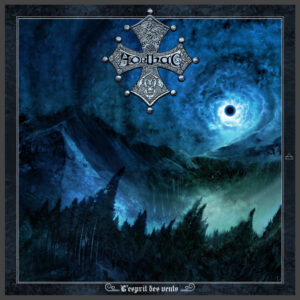It has been a long wait, but finally, some ten years after the journey began, epic black metallers Aorlhac (pronounced ‘our-yuck’) have returned to finish the trilogy which started with ‘La Croisee des vents’ in 2007. Following on from 2010’s ‘La Cite des Vents’, L’espirit des vents’ is a ten-track exploration of the band’s Occitan roots, detailing the history and culture of the region that now incorporates the South of France, Italy and Spain. Taking inspiration from the likes of Windir, Suhnopfer and Dissection, the band deal in a powerful and immensely lyrical version of black metal that does much to fire the imagination with its gruelling riffs and harrowing vocals. With near-perfect production that stands just on the right side of raw, with clear separation between the instruments, but enough grit to keep the album from becoming overly-processed, there’s no doubt that the gap between albums has allowed for considerable progression in terms of both song-writing skill and production, and the result is frequently stunning.
Opening with the evocative, wind-strewn riffs of ‘Aldevica’, Aorlhac do much to summon the eerie imagery of their cover art as guttural screams tear across the landscape and dense flurries of percussion cloud the horizon. An atmospheric opening it pales in comparison to the lengthy exhortations of ‘la vevolte des tuchins’, a slower, more dramatic piece with a folk influence that sees melody and metallic might competing for supremacy. Reminiscent of Winterfylleth’s scarifying delivery, ‘La vevolte des tuchins’ is masterly black metal delivered with power and precision, but with a deft grasp of melody and tradition that helps the band rise from the serried rows of their peers. Spellbound, meanwhile, delivers an astonishing vocal performance that captures so much raw anguish, that his spine-chilling cries dominate the track despite the impressive riffing of guitarist NKS. Lengthy and punishingly violent, ‘Infame Saurimonde’ incorporates droning chants that recall the pagan classical masterpiece ‘Carmina Burana’, whilst Lonn lays down an explosive barrage of percussion that evokes images of epic battles and landscapes drenched with the blood and sweat of the fallen. With traditional instrumentation and spoken word passages, ‘infame surimonde’ is a black metal masterclass and if this were all the album would have to offer, it would be enough to consider it one of the year’s dark highlights. A more visceral flex of the muscle is apparent on the blistering ‘Ode a la croix Clechee’, although melody is never far from the mix, and the band are careful never to diminish their carefully constructed art by allowing it to turn into a lightning-speed blur. Another highlight, ‘1802-1869 Les Mefaits de Mornac’ sees the band once again incorporate traditional folk elements without allowing them to overwhelm the black metal might on display. The result is awe-inspiring to say the least and it leaves the listener gasping with the cold as the snow-swept landscape of the cover is once more bought into startling focus.
Stepping deftly away from atmospheric black metal, ‘Mandrin, l’enfant perdu’ is remarkably direct, recalling Satyricon and Celtic Frost with its laser-precise riffing and demonic vocals. If black metal did singles, this monstrous slab of ultra-heavy extremity would be a sure-fire hit and it feels like a dash of cold water to the face after the more ethereal exploration of ‘1802-1869’. Boasting white-hot riffs juxtaposed with an insistent melody, ‘la procession des trespasses’ evokes images of battlefields unearthed and strewn with the corpses of the slain and, once again, it is Spellbound who captures the attention with a vocal performance that borders on the theatrical so powerfully emotional is his delivery. Strangely beautiful, despite the gauging horror of NKS’ riffing, ‘une vie de reclus (quand les ramparts ne prot egent plus)’ sees the guitars transmuted into something otherworldly and spectral and the only option is to sit back and let the music roll over you and consume your senses. The album’s final full-length track is ‘L’ora es venguda’, a dizzying piece of music sees Aorlhac demonstrate greater mastery of the technical and emotional aspects of pagan metal in one song than many bands achieve in an entire career. It leaves only the short, and profoundly beautiful, coda, ‘l’espirit des vents’ to conclude the album and leave the listener emotionally and physically drained.
At a time when many of the leading black metal exponents of the mid-90s have headed toward more atmospheric, post-black metal pastures, Aorlhac are proudly flying the flag for a darker strain of black metal where traditional and folk influences abound without overwhelming the sound. Drawing upon the likes of Emperor, Darkthrone and Windir, Aorlhac craft epic soundscapes upon which Spellbound delivers his dark proclamations. There’s something incredibly vital about Aorlhac’s music, about the way that it ebbs and flows across the album’s run time and the production, which is both mind-numbingly heavy and yet strangely beautiful, plays a huge part in this. A perfect example of music, art and tradition coming together in perfect symbiosis, ‘L’espirit des vents’ is a masterpiece in every sense of the word. 10




